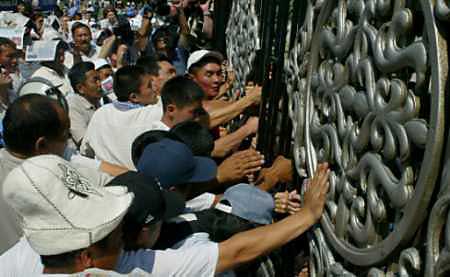
KYRGYZ GOVERNMENT BLAMES AKAYEV FOR COUNTER-REVOLUTIONARY UPRISING IN BISHKEK
Publication: Eurasia Daily Monitor Volume: 2 Issue: 120
By:

On June 17 an angry crowd of about 5,000 people gathered in central Bishkek to support Urmat Baryktabasov, who had been refused official registration for the July 10 presidential election. For Bishkek residents this riot was puzzling. How could Baryktabasov, an unknown politician, a citizen of Kazakhstan, and an ally of ousted president Askar Akayev, gather such support in a short period of time? The Central Election Commission officially denied him registration, but instead of using legal means to challenge the commission’s decision, Baryktabasov organized a violent protest. Kyrgyz law-enforcement agencies will soon start an investigation of Baryktabasov. He is already under surveillance by the Kazakh security structures.
The government had to resort to armed force to break up the crowds. Five militiamen were injured, and the militia detained 216 people. Most of the detainees confessed that they had each received 300-1,000 soms ($6-20) to come to the main square in Bishkek (Kabar, June 19). In total, according to the militia, about $28,000 was spent to raise a crowd against the government. Aidar Akayev, son of the ousted president, also reportedly was present in Bishkek on June 17 (Interfax, June 19).
The government’s official version of the June 17 events indicates that the Akayev family, including his son-in-law Adil Toigonbayev, organized the riot in order to suspend presidential elections for several months and field their own candidate (Kabar, June 19). Deputy Prime Ministers Daniyar Usenov and Adakhan Modumarov announced that the party founded by Baryktabasov, “Mekenim-Kyrgyzstan” (Motherland-Kyrgyzstan) was organized in parallel with “Alga, Kyrgyzstan,” the pro-Akayev bloc led by Bermet Akayeva.
Shortly after the Baryktabasov riots, the Kyrgyz parliament began discussing the possibility of postponing the presidential elections. But the government strongly opposes this option. Acting President Kurmanbek Bakiyev harshly criticized the security structures and top security officials for not preventing the riot. Felix Kulov, acting prime minister, officially promised to stop skirmishes in the country. Until the presidential election the state security structures will maintain strict control over situation in the country: “I will myself take up arms to defend the White House and the current power,” declared Bakiyev (Kabar, June 17). The parliament, which was not dissolved after the March 24 revolution, is comprised of influential businessmen and remains a source of Akayev’s support.
The possible origin of the current crisis around Baryktabasov can be traced to early April when a number of infamous Kyrgyz politicians and businessmen abruptly announced their intentions to run for the presidency. Baryktabasov and Nurbek Turdukulov, head of Bitel GSM, were believed to be protégés of Askar Akayev in the new political regime. Before Bakiyev and Kulov agreed to join forces in May, Baryktabasov had backed Kulov, because evidence suggested that Kulov was also secretly allied with Akayev and had the strongest chances, after Bakiyev, to become the next president. However, after Kulov allied with the acting president, Baryktabasov decided to run independently. Baryktabasov needed to quickly broadcast his candidacy to the wider public and mass riots were the best opportunity for that. Two factors helped Baryktabasov stage the riots: his Kazakh ties and the CEC’s refusal to register his candidacy. Rated among top businessmen in Kazakhstan, Baryktabasov possesses enormous funds to execute his political plans, and the refusal provided the opportunity.
The assault on the government building must be interpreted as an organized attempt to violently seize state power; it has nothing to do with democracy or freedom of association, says Edil Baisalov, leader of the Coalition for Democracy and Civil Society. Mekenim-Kyrgyzstan uses pseudo-political mottos, possesses vast financial resources, and enjoys popularity thanks to the material support of its members, according to Baisalov (Kabar, June 17).
Akayev, his daughter, and son have challenged the interim government in local and international courts (see EDM, May 31). So far they have not been successful in any of their lawsuits. Akayev’s lawyer, Maxim Maximovich, continually baits government figures, raising their own legal responsibilities. From his numerous interviews to Russian newspapers, Akayev apparently blames the new government for the deteriorating security situation in Kyrgyzstan.
After widespread looting in Bishkek and organized aggressive provocations of protestors on March 24, local residents realize what resources the previous regime can still wield to revenge its humiliating downfall.
With ample financial assets and some supporters in Kyrgyzstan, the ousted president’s family members are still able to resort to sophisticated means to destabilize the country. In the days immediately following the March 24 revolution, rumors that Toigonbayev had possibly contaminated the city’s tap water quickly spread across the city, causing mass panic. Similarly, the June 17 riots provoked a new wave of nervousness among Bishkek residents. A number of Bishkek shops and offices temporally closed on June 17, frightened by the possibility of another spate of mass looting.




